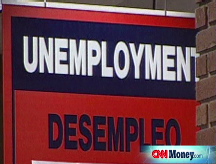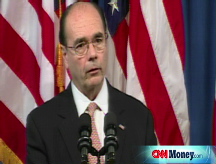Paulson's plan: So far, so good
Mortgage rates drop in a possible boon to homebuyers, but despite that silver lining there's no averting a recession.
NEW YORK (Fortune) -- Wall Street likes Henry Paulson's plan to break the logjam in the mortgage markets. But the Treasury secretary and other policymakers still have much work to do to get the economy on a more steady footing.
Financial markets rallied Monday in the wake of Treasury Secretary Henry Paulson's plan to take the two biggest U.S. mortgage-finance companies, Fannie Mae (FNM, Fortune 500) and Freddie Mac (FRE, Fortune 500), into government custody. But Tuesday's pullback - fed in part by reports that struggling brokerage Lehman Brothers (LEH, Fortune 500) has failed in its bid to sell a stake to investors in Korea - offers a reminder that merely easing the housing bust won't get the economy humming again.
That said, the early success of the Paulson plan is noteworthy. The stock market got a significant bounce Monday, even as Fannie and Freddie themselves became penny stocks, trading for the first time in history below a dollar each. Far more important, though, was the action in the markets for the mortgage-backed securities Fannie and Freddie traffic in.
As Paulson had hoped, the spread between the yield on mortgage-backed securities and risk-free Treasury bonds narrowed sharply Monday and mostly held those gains Tuesday. The tightening of those spreads has the effect of bringing down rates on the mortgages the companies are eligible to buy or guarantee - so-called conforming loans, typically those of $417,000 or less though up to $729,000 in some pricier areas. The rate for a conforming 30-year fixed mortgage fell to 5.88% Monday from 6.26% a week ago, according to BankRate.com.
The steep decline in mortgage rates will be good news for the housing market if it holds, by allowing some troubled homeowners to refinance and by generally making financing more available.
"Mortgages tightened a ton," says Merrill Lynch mortgage-backed securities strategist Akiva Dickstein. "The question now is whether there's more tightening to come."
If so, people looking to buy houses could find purchasing a house more affordable. That could bring more buyers into a market struggling to digest near record levels of houses for sale, and slow the decline of prices. Prices in 20 big metro areas have fallen 16% over the past year, according to data from the S&P/Case-Shiller national survey.
In an additional bit of good news, Treasury bond prices rose in the wake of the rally in mortgage-backed bonds, and the dollar continued its two-month-long ascent against other major currencies. There has been some concern that a bailout of the GSEs could prompt a selloff in the dollar and Treasurys, because the sheer scope of Fannie and Freddie's gross obligations - together they own or guarantee more than $5 trillion of mortgages - stands to add significantly to the government's liabilities.
But Rebecca Patterson, global head of foreign exchange at J.P. Morgan's Private Bank, says currency traders are less concerned with the oft-invoked $5 trillion figure than with the putative actual cost of the bailout. The tab associated with Treasury's plan could run into the hundreds of billions of dollars, given possible outlays tied to a decision to extend Fannie and Freddie an unlimited credit line, to purchase preferred shares in the companies, and to buy mortgage-backed securities. And it could end up costing a good deal less if the companies' credit losses don't spiral out of control.
"The net amount is not that large" in the context of the $5 trillion in existing on-balance sheet government obligations, Patterson says. She adds that investors generally are reacting favorably because the move "removes one more tail risk" - the improbable but highly costly prospect of a default by the companies.
While the early reaction to the Fannie-Freddie takeover has been roundly positive, history shows that could change. Dickstein points out that mortgage spreads initially narrowed in response to Paulson's decision in July to ask Congress for the authority to use taxpayer dollars to backstop the companies. Paulson famously insisted at the time that he didn't believe he would have to use the authority, likening his legislative blank check to a bazooka he would never have to fire.
But after the initial success of that shock-and-awe effort, mortgage rates surged again. Dickstein says the problem was that the capital-constrained GSEs were unable to purchase mortgage-backed securities at a time when other investors were fleeing risk as well. That sent the prices for those issues higher at a time when Treasury prices were falling, widening the spreads. "It was more of a supply-demand trade," he says.
Dickstein adds that he believes Treasury's decision to purchase mortgage-backed securities - a move he calls "unprecedented" - will lend substantial backing to the market for MBS paper.
But if the mortgage market is getting a boost, there's little hope it will help the economy avert the recession it has been heading toward for more than a year. For one thing, economists expect to see further house-price declines, as weak demand and a glut of supply inexorably bring the cost of buying a house back into line with rental rates and incomes.
Meanwhile, there is no end in sight to other dour trends. Banks stuffed with bad loans remain unwilling to extend credit, and joblessness is on the rise. The U.S. has lost private-sector jobs in each of the past eight months. But Ashraf Laidi, currency strategist at CMC Markets in New York, notes that the job-loss cycles in the 1990-91 and 2001-2002 recessions lasted 11 and 15 months, respectively.
Meanwhile, big financial sector employers such as Lehman and AIG confront a souring credit market as they consider how to raise new money to fill holes in their balance sheets left by the multibillion-dollar mortgage-related losses of the past year.
The flood of bad news has some observers saying someone in the nation's leadership is going to have to come up with a more sweeping answer before the markets, and the economy, are able to make a sustained recovery.
"Government actions continue to attempt to maintain the status quo among financial institutions," Merrill Lynch equities strategist Rich Bernstein writes in a note Monday. "There has yet to be a remedy that approaches the credit crisis as a systemic problem. As with the Bear Stearns situation, the GSEs are being treated as a one-off problem." ![]()
-
 The retail giant tops the Fortune 500 for the second year in a row. Who else made the list? More
The retail giant tops the Fortune 500 for the second year in a row. Who else made the list? More -
 This group of companies is all about social networking to connect with their customers. More
This group of companies is all about social networking to connect with their customers. More -
 The fight over the cholesterol medication is keeping a generic version from hitting the market. More
The fight over the cholesterol medication is keeping a generic version from hitting the market. More -
 Bin Laden may be dead, but the terrorist group he led doesn't need his money. More
Bin Laden may be dead, but the terrorist group he led doesn't need his money. More -
 U.S. real estate might be a mess, but in other parts of the world, home prices are jumping. More
U.S. real estate might be a mess, but in other parts of the world, home prices are jumping. More -
 Libya's output is a fraction of global production, but it's crucial to the nation's economy. More
Libya's output is a fraction of global production, but it's crucial to the nation's economy. More -
 Once rates start to rise, things could get ugly fast for our neighbors to the north. More
Once rates start to rise, things could get ugly fast for our neighbors to the north. More













